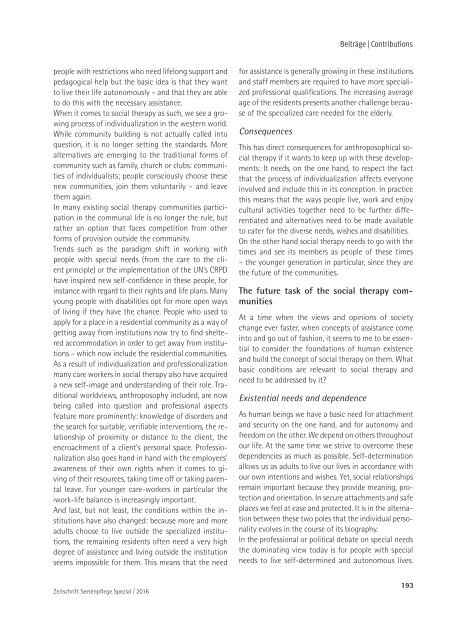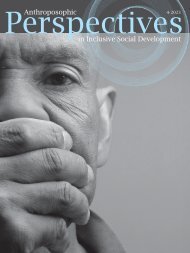Seelenpflege 2016-3-4 Spezial
Seelenpflege 2016-3-4 Spezial
Seelenpflege 2016-3-4 Spezial
Create successful ePaper yourself
Turn your PDF publications into a flip-book with our unique Google optimized e-Paper software.
Beiträge | Contributions<br />
people with restrictions who need lifelong support and<br />
pedagogical help but the basic idea is that they want<br />
to live their life autonomously – and that they are able<br />
to do this with the necessary assistance.<br />
When it comes to social therapy as such, we see a growing<br />
process of individualization in the western world.<br />
While community building is not actually called into<br />
question, it is no longer setting the standards. More<br />
alternatives are emerging to the traditional forms of<br />
community such as family, church or clubs: communities<br />
of individualists; people consciously choose these<br />
new communities, join them voluntarily – and leave<br />
them again.<br />
In many existing social therapy communities participation<br />
in the communal life is no longer the rule, but<br />
rather an option that faces competition from other<br />
forms of provision outside the community.<br />
Trends such as the paradigm shift in working with<br />
people with special needs (from the care to the client<br />
principle) or the implementation of the UN’s CRPD<br />
have inspired new self-confidence in these people, for<br />
instance with regard to their rights and life plans. Many<br />
young people with disabilities opt for more open ways<br />
of living if they have the chance. People who used to<br />
apply for a place in a residential community as a way of<br />
getting away from institutions now try to find sheltered<br />
accommodation in order to get away from institutions<br />
– which now include the residential communities.<br />
As a result of individualization and professionalization<br />
many care workers in social therapy also have acquired<br />
a new self-image and understanding of their role. Traditional<br />
worldviews, anthroposophy included, are now<br />
being called into question and professional aspects<br />
feature more prominently: knowledge of disorders and<br />
the search for suitable, verifiable interventions, the relationship<br />
of proximity or distance to the client, the<br />
encroachment of a client’s personal space. Professionalization<br />
also goes hand in hand with the employees’<br />
awareness of their own rights when it comes to giving<br />
of their resources, taking time off or taking parental<br />
leave. For younger care-workers in particular the<br />
‹work-life balance› is increasingly important.<br />
And last, but not least, the conditions within the institutions<br />
have also changed: because more and more<br />
adults choose to live outside the specialized institutions,<br />
the remaining residents often need a very high<br />
degree of assistance and living outside the institution<br />
seems impossible for them. This means that the need<br />
for assistance is generally growing in these institutions<br />
and staff members are required to have more specialized<br />
professional qualifications. The increasing average<br />
age of the residents presents another challenge because<br />
of the specialized care needed for the elderly.<br />
Consequences<br />
This has direct consequences for anthroposophical social<br />
therapy if it wants to keep up with these developments:<br />
It needs, on the one hand, to respect the fact<br />
that the process of individualization affects everyone<br />
involved and include this in its conception. In practice<br />
this means that the ways people live, work and enjoy<br />
cultural activities together need to be further differentiated<br />
and alternatives need to be made available<br />
to cater for the diverse needs, wishes and disabilities.<br />
On the other hand social therapy needs to go with the<br />
times and see its members as people of these times<br />
– the younger generation in particular, since they are<br />
the future of the communities.<br />
The future task of the social therapy communities<br />
At a time when the views and opinions of society<br />
change ever faster, when concepts of assistance come<br />
into and go out of fashion, it seems to me to be essential<br />
to consider the foundations of human existence<br />
and build the concept of social therapy on them. What<br />
basic conditions are relevant to social therapy and<br />
need to be addressed by it?<br />
Existential needs and dependence<br />
As human beings we have a basic need for attachment<br />
and security on the one hand, and for autonomy and<br />
freedom on the other. We depend on others throughout<br />
our life. At the same time we strive to overcome these<br />
dependencies as much as possible. Self-determination<br />
allows us as adults to live our lives in accordance with<br />
our own intentions and wishes. Yet, social relationships<br />
remain important because they provide meaning, protection<br />
and orientation. In secure attachments and safe<br />
places we feel at ease and protected. It is in the alternation<br />
between these two poles that the individual personality<br />
evolves in the course of its biography.<br />
In the professional or political debate on special needs<br />
the dominating view today is for people with special<br />
needs to live self-determined and autonomous lives.<br />
Zeitschrift <strong>Seelenpflege</strong> <strong>Spezial</strong> / <strong>2016</strong><br />
193






